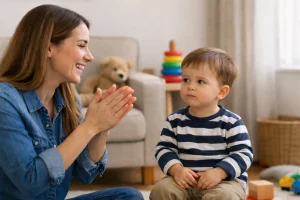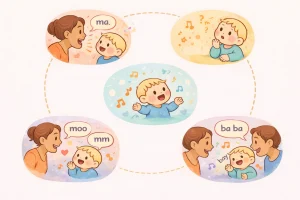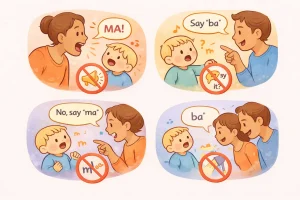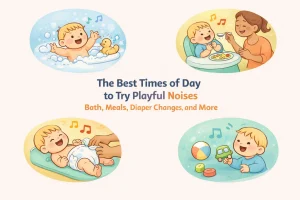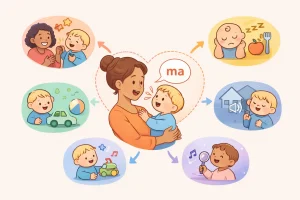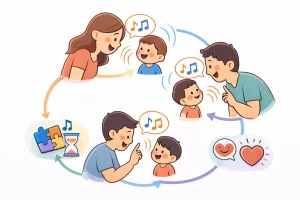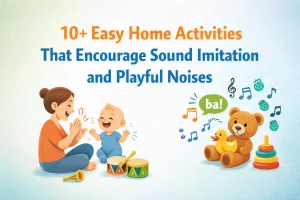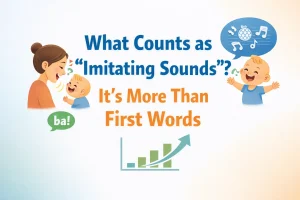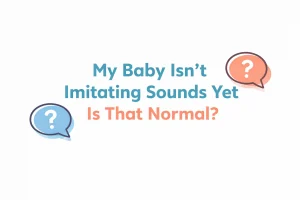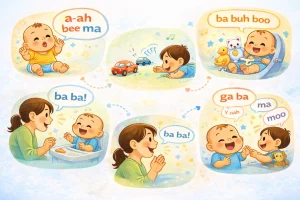What to Expect from Your 2-Year-Old’s Speech and Language Development
By Rajini D
Last Updated: October 14, 2025
By the time your child turns 2, you’ll likely notice exciting changes in how they talk, listen, and interact. Maybe they’re saying simple words like “mama” or “ball,” or even starting to put two words together like “more juice.” This stage is full of little milestones that show your toddler’s brain is growing — fast.
But here’s something important to remember: every child develops at their own pace. Some toddlers are chatterboxes, while others may be quieter. And that’s okay. What matters most is knowing what’s typical, what might need a closer look, and how you can support their journey.
Free Speech Help for Kids
Concerned about speech delays? Book a free consultation with our expert speech therapist and get guidance tailored to your child’s needs.
2-Year-Old Speech Milestones: What’s Normal?
By age 2, many toddlers experience a burst in communication. They go from saying just a few words to using language to express needs, name objects, and interact with people around them. But as a parent, it’s natural to wonder — what’s actually normal at this stage?
Let’s take a closer look at some typical 2 year old speech milestones and what you can expect.
Also read: Speech Development Milestones: Your Child’s Talking Journey
Typical Speech Milestones for 2-Year-Olds
Here’s a quick table to help you understand what many toddlers are doing around their second birthday:
| Skill | What’s Typical at Age 2 |
|---|---|
| Vocabulary | Uses 50–100+ words |
| Word Combinations | Begins using two-word phrases |
| Understanding | Follows simple instructions (“Give me the ball”) |
| Interaction | Greets others, uses words to get attention |
| Sounds | Makes a variety of speech sounds clearly enough for familiar listeners to understand 50% of the time |
How Many Words Should a 2-Year-Old Say?
Most 2-year-olds can say at least 50 words, and some say well over 100. These words are usually simple — like “mama,” “dog,” “milk,” or “bye-bye.” Your toddler may also start labeling familiar things, such as body parts, toys, or animals.
Some common types of words at this stage include:
- Nouns (ball, car, apple)
- Verbs (go, eat, sleep)
- Social words (hi, no, more, please)
Keep in mind: if your toddler isn’t using 50 words yet but understands you well and is trying to communicate, that’s still a good sign of development.
When Do Toddlers Start Putting Words Together?
Around 18 to 24 months, many toddlers begin using two-word phrases like:
- “More juice”
- “Daddy go”
- “Big truck”
- “All done”
This marks the beginning of toddler sentence development — a big step in learning how to communicate more clearly. If your child is saying single words and starting to link two ideas together, they’re on the right track.
You can help by:
- Repeating and expanding their phrases
- Reading books with simple, repetitive lines
- Singing songs that pair actions with words
2-Year-Old Language Skills: What to Look For
At 2 years old, language isn’t just about talking — it’s also about understanding. Some toddlers may say fewer words but understand a lot more than they can express. That’s why it’s helpful to look at both receptive and expressive language when tracking your child’s progress.
Understanding (Receptive Language in Toddlers)
Receptive language is your child’s ability to understand words and instructions — even before they can respond clearly. By age 2, toddlers typically:
- Follow 1-step commands like “Come here” or “Give me the toy”
- Recognize names of familiar people, objects, and body parts
- Respond to questions like “Where’s your nose?”
- Understand simple yes/no questions
Tip: If your toddler seems to “tune out” or doesn’t respond to their name, it’s worth watching more closely. Sometimes hearing issues can affect receptive language skills.
Talking (Expressive Language at Age 2)
Expressive language is what your child says out loud — the words, phrases, and sounds they use to express needs, feelings, or ideas. A 2-year-old typically:
- Uses 50 or more words
- Says two-word phrases like “want milk” or “go outside”
- Tries to name objects, people, or actions
- Echoes words they hear
- Starts asking simple questions (“What’s that?”)
Your toddler’s words may not be crystal clear, and that’s okay! Most children at this age are understood by familiar adults about 50% of the time.
Speech Delay in 2-Year-Olds: When to Worry
It’s normal to have questions — Is my child talking enough? Should I be concerned? Trust your instincts. If something feels off, it’s okay to explore support early.
Signs Your Toddler May Need Help
If your 2-year-old is not meeting typical milestones for speech and language, here are some signs to watch for:
- Says fewer than 20–25 words by age 2
- Isn’t combining two words (e.g., “want toy”)
- Doesn’t respond to simple requests
- Rarely makes eye contact or interacts with others
- Seems frustrated when trying to communicate
- Has a sudden loss of words they used to say
Every child is different, but if you notice several of these signs, it’s a good idea to check in with a speech-language therapist.
Common Causes of Speech Delays in Toddlers
Speech delays can happen for many reasons — and they’re more common than most parents think. Some possible causes include:
- Hearing issues (chronic ear infections, undiagnosed hearing loss)
- Oral-motor difficulties (trouble coordinating mouth movements)
- Autism spectrum signs (delays paired with limited social interaction)
- Too much screen time and limited face-to-face interaction
- Family history of speech delays or late talking
- Bilingual home environment (not a problem, but can cause a temporary lag)
Early support makes a big difference. With the right guidance, many toddlers quickly catch up.
How to Support Your Toddler’s Speech Development at Home
When to Seek Speech Therapy for Toddlers
If you’re feeling unsure about your toddler’s speech progress, you’re not alone — many parents wonder if their child is just taking their time or truly needs help. The good news? You don’t have to guess. Knowing when to consult a speech therapist can give you peace of mind and the right support, if needed.
When Should You Consider Speech Therapy?
Here are some signs that may mean it’s time to talk to a professional:
| Concern | What It Might Mean |
|---|---|
| By age 2, says fewer than 20–25 words | May benefit from early support |
| Not combining two words (e.g., “want toy”) | Could need help with sentence development |
| Doesn’t respond to name or simple directions | Might be a sign of receptive language delay |
| Limited eye contact or engagement | Could be linked to social communication delays |
| Gets frustrated when trying to speak | May indicate difficulty expressing thoughts clearly |
If you’ve noticed any of these signs, trust your instincts. It’s always better to check early than wait and worry.
Benefits of Early Speech Therapy for Toddlers
Why acting early matters:
- Helps your child build confidence in communication
- Reduces frustration and tantrums caused by language delays
- Supports better school readiness
- Encourages stronger parent-child bonding through better understanding
- Improves long-term speech and language outcomes
How Wellness Hub Can Help
At Wellness Hub, we believe every child deserves to be heard — and every parent deserves guidance. We offer:
- Expert-led speech therapy for toddlers, both online and in-person
- Personalized therapy plans based on your child’s unique needs
- Access to the BASICS app — packed with interactive tools you can use at home
- A free consultation to help you decide if therapy is right for your child
Every Word Counts — Start Supporting Today
If your 2-year-old isn’t saying as much as you expected, don’t worry — every child develops in their own way. What matters most is steady progress and the support they get along the way. You’re already doing so much just by being here, learning how to help your little one.
Remember, speech and language skills don’t grow overnight. But with daily interaction, the right tools, and gentle guidance, your toddler can thrive. Whether it’s talking during play, reading picture books, or using two-word phrases — each word builds a stronger foundation for communication.
Conclusion
Every child learns to talk at their own pace. Some start early, others need more time — and that’s okay. What matters is giving your toddler the right support every day. Talking, playing, reading, and using simple words can help your child learn to speak better over time. If you’re unsure about your child’s progress, early help makes a big difference. At Wellness Hub, we offer expert-led speech therapy, helpful tools, and a free consultation to guide you.
Frequently Asked Questions:
1. What are normal speech milestones for a 2-year-old?
By the age of 2, many toddlers can say 50 to 100 words. They may start to use simple two-word phrases, like “want toy” or “go out.” Your child might name familiar things, point to body parts, follow easy instructions, and try to copy your words. But keep in mind—every child develops at their own speed. If you’re unsure about what’s typical, tracking milestones can help.
2. How many words should my 2-year-old say?
Most 2-year-olds speak at least 50 words, but some may say more. These can include names, everyday objects, actions, and social words like “bye-bye” or “no.” If your child is saying fewer than 20 words or mostly uses gestures instead of speech, it’s a good idea to speak with a pediatrician or speech therapist.
3. Is it normal for a 2-year-old not to talk yet?
While some children may talk later than others, not speaking at all by age 2 is something to watch. If your toddler isn’t using words or only makes sounds or gestures, it could be a sign of a speech delay. Getting help early—such as through a speech therapy evaluation—can make a big difference.
4. When do toddlers start using two-word phrases?
Children usually begin forming two-word sentences between 18 and 24 months. You might hear phrases like “want water,” “mama come,” or “more snack.” If your toddler is using single words but hasn’t started combining them by 2 years old, this could be a sign to check in with a speech-language expert.
5. What causes speech delay in toddlers?
There are several common causes of speech delay in toddlers, including:
- Hearing problems (e.g., frequent ear infections)
- Autism spectrum disorder
- Oral-motor delays (difficulty moving the mouth)
- Too much screen time
- Lack of social interaction
- Family history of late talking
A speech therapist can help figure out what’s going on and suggest next steps.
6. How can I help my 2-year-old talk more?
You can support speech by:
- Talking to your child throughout the day during routines
- Naming objects during play or meals (“This is a spoon”)
- Reading simple, repetitive books
- Singing songs like “Old MacDonald” or “Twinkle Twinkle”
- Giving your child time to respond in conversations
7. Should I worry if my 2-year-old doesn’t respond to their name?
Yes, this can be a red flag for delayed language or social development. If your child doesn’t look at you or respond when you say their name, it could be related to a hearing issue, attention difficulty, or early signs of autism. It’s best to bring this up with your pediatrician or get an evaluation with a speech and language expert.
8. What is the difference between receptive and expressive language?
Receptive language is what your child understands — like following a command or pointing to a toy when asked. Expressive language is what they say — such as using words, phrases, or gestures to communicate. Some toddlers understand a lot more than they can say, and that’s normal. But if your child struggles with both understanding and speaking, early support is important.
9. When should I get speech therapy for my toddler?
You should consider speech therapy for toddlers if:
- Your child says fewer than 20–25 words by age 2
- They don’t combine words like “more juice”
- They rarely make eye contact or show interest in others
- They get easily frustrated when trying to talk
10. Where can I find speech therapy support for my child?
You can start with a free consultation at Wellness Hub. We offer:
- Online and offline therapy for toddlers
- Personalized, expert-led speech programs
- Home tools and parent-friendly guides through our BASICS app
About the Author:
Rajini Darugupally
M.Sc., Speech-Language Pathologist (9+ years of experience)
Rajini is a passionate and dedicated Speech-Language Pathologist with over 9+ years of experience, specializing in both developmental speech and language disorders in children and rehabilitation in adults. Driven by a desire to empower each individual to find their voice, Rajini brings a wealth of experience and a warm, genuine approach to therapy. Currently, at Wellness Hub, she thrives in a team environment that values innovation, compassion, and achieving results for their clients.
Book your Free Consultation Today
Parent/Caregiver Info:
Client’s Details:
* Error Message
